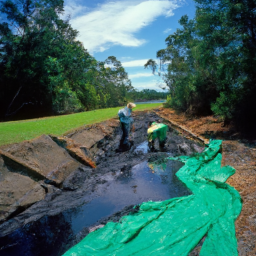In recent days, Far North Queensland has been grappling with the aftermath of a significant industrial spill that has raised serious environmental concerns. A building company, Boral, has reported a substantial leak of thousands of liters of kerosene and bitumen from one of its plants, which has contaminated a nearby creek. This creek is particularly concerning as it connects to an inlet that leads directly to the Great Barrier Reef, a UNESCO World Heritage site known for its biodiversity and ecological significance. The incident has prompted immediate action from Boral, which has initiated a clean-up operation to mitigate the impact of the spill. In my experience as a journalist covering environmental issues, such spills can have devastating effects not only on local ecosystems but also on the broader environmental health of regions connected to vital natural resources. The Great Barrier Reef, in particular, is already under stress from climate change, pollution, and overfishing, making this incident even more alarming. Boral has stated that they are working diligently to contain the spill and prevent further contamination. According to official reports, the company has deployed specialized teams to assess the extent of the spill and implement clean-up measures. These teams are utilizing absorbent materials and other containment strategies to limit the spread of the kerosene and bitumen. However, the effectiveness of these measures will depend on various factors, including weather conditions and the speed of the response. Experts in environmental science and pollution control have weighed in on the situation, emphasizing the potential long-term consequences of such spills. Research shows that hydrocarbons like kerosene and bitumen can have toxic effects on aquatic life, disrupting ecosystems and harming species that rely on clean water for survival. Studies confirm that spills of this nature can lead to bioaccumulation of harmful substances in the food chain, ultimately affecting not just marine life but also human populations that depend on these resources for food and recreation. The implications of this spill extend beyond immediate environmental damage. The Great Barrier Reef is a critical economic asset for Australia, attracting millions of tourists each year. According to government data, the reef contributes approximately 6 billion annually to the Australian economy. The potential for long-term damage to this natural wonder could have significant repercussions for local businesses and communities that rely on tourism for their livelihoods. As observed in similar incidents around the world, the response to industrial spills often involves a complex interplay of regulatory oversight, corporate responsibility, and community engagement. Regulatory agencies are likely to conduct investigations into the spill to determine the cause and assess compliance with environmental standards. This process may involve scrutinizing Borals operational practices and emergency response protocols. In addition to regulatory scrutiny, community members and environmental advocates are voicing their concerns about the spills impact. Local organizations are calling for greater transparency from Boral regarding the clean-up efforts and the potential risks associated with the spill. There is a growing demand for accountability and a commitment to preventing similar incidents in the future. Experts agree that proactive measures, including stricter regulations and improved safety protocols, are essential to safeguarding the environment and public health. The clean-up operation is expected to be a lengthy process, with ongoing monitoring required to assess the effectiveness of the measures implemented. Boral has indicated that they will work closely with environmental agencies to ensure compliance with all necessary regulations and to restore the affected areas as much as possible. However, the long-term recovery of the ecosystem may take years, if not decades, depending on the severity of the contamination. In conclusion, the industrial spill in Far North Queensland serves as a stark reminder of the vulnerabilities faced by our natural environments. As the clean-up efforts continue, it is crucial for all stakeholdersgovernment agencies, corporations, and communitiesto collaborate in addressing the immediate impacts and preventing future incidents. The health of the Great Barrier Reef and the surrounding ecosystems is not just an environmental issue; it is a matter of economic and social importance for the region. Moving forward, it is imperative that lessons learned from this incident inform policies and practices aimed at protecting our invaluable natural resources for generations to come.
TRENDING NOW
WORLD
Global Messaging Trends: Can Local Apps Like Arattai Overtake Giants?
44% 🔥
POLITICS
Accusations fly over whether Republicans or Democrats 'own' shutdown
35% 🔥
POLITICS
Rep. Mike Haridopolos, R-Fla., talks about the government shutdown
34% 🔥
POLITICS
What happens now that the government has shut down. And, a pricing deal with Pfi...
26% 🔥
POLITICS
Married, but no connection: Reality of silent divorces in Indian homes
31% 🔥
POLITICS
Netanyahu's apology to Qatar, phone on Trump's lap: A telling White House photo
38% 🔥
MOST READ
SPORTS
Week 5 NFL odds, lines, betting picks, spreads: 2025 predictions: Model backs Sa...
55% 🔥
SPORTS
Predicting every undefeated college football team's first loss: Will anyone beat...
36% 🔥
SPORTS
Tigers Lefty Tarik Skubal Deserves Second Straight AL Cy Young Award
54% 🔥
SPORTS
Jets Get Official Braelon Allen Injury Diagnosis
61% 🔥
SPORTS
Gill: India won't be 'looking for any easy options' against West Indies
49% 🔥
SPORTS
Phil Mickelson takes a jibe at golf during friendly banter with ex-LIV Golf CEO’...
39% 🔥

